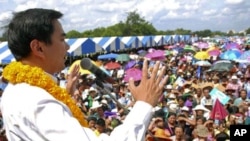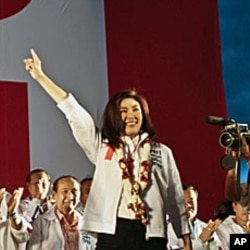Thailand’s opposition Pheu Thai Party says it is confident of an electoral victory, with opinion polls giving the party a lead over the governing Democrat Party less than two weeks before a national election.
Of the more than 100,000 voters polled by the Suan Dusit Rajabhat University, more than 51 percent expressed support for the Pheu Thai Party. The ruling Democrat Party of Prime Minister Abhisit Vejjajiva received about 34 percent support. Analysts say the survey is an indicator of support for the remaining 375 local constituent seats.
At a weekend political rally, Pheu Thai Party leader Yongyuth Wichaidit is confident the party will gain seats.
"I think we are progressing, very good. At least both constituency and party lists it should be 248. If we have got an absolute majority in the parliament - this problem will not be serious. But if we not win an absolute majority - less than 250 - then we should be bargaining with the middle or small party," Wichaidit explained.
The major parties have stepped up campaigning before the July 3 election, the first since 2007. The Pheu Thai Party is led by Yingluck Shinawatra, younger sister of former ruler Thaksin Shinawatra, who fled Thailand in 2008 in the face of corruption charges after being deposed in a coup in 2006. Thaksin's hopes of a return to Thailand rest on Pheu Thai winning the July 3 polls.
During the weekend in central Bangkok 5,000 Pheu Thai supporters dressed in the familiar red shirts rallied.
Popular activist Natawut Saikua criticized the government's policies.
Natawut, a candidate and a leader of the United Democratic Front Against Dictatorship (UDD), or red shirts, is confident the party will secure an overall majority in the 500-seat parliament.
"Yes, I think we can have more than 250, yes," he said.
The Democrat Party says the vote will be closer than the polls indicate. All major candidates supported by the Democrat and Pheu Thai parties are pushing hard on populist policies to secure victory at the polls.
The Democrat Party's programs include income guarantee programs for rice farmers, free education for children, and a modest pension program for the elderly.
The Pheu Thai Party promises to double the minimum wage, sharply raise rice prices for farmers, provide tablet computers for school children, create a $3 billion program for villages, and a debt moratorium for low income earners.
But leader of the Rak Thai (Love Thai) Party, Chuwit Kamolvisit, a former massage parlor owner turned politician, says populist policies may create problems for Thai society in the long run.
"The point is they use the political [policy] before the economic. All Thai politicians try to offer populism, which means that it is an addict [addiction]. Once you have used this to the Thai society to the poor people they get everything for free," Kamolvisit stated.
Chuwit says such policies may undermine people's capacity of self reliance. Economists and business leaders also fear the impact of higher wages on employment, with sharply higher government rice prices undermining Thailand's global position as the leading rice exporting nation.











